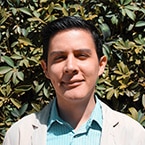AACR Patient Advocate Posters 2022
AACR was honored to showcase patient advocate posters at the 15th Annual Conference on the Science of Cancer Health In Racial/Ethnic Minorities and the Medically Underserved in Philadelphia, Pennsylvania.
Brittney Fernandez – University of Texas

Abstract Title: Bridging the gap between cancer care service delivery and the sexual and gender minority
Abstract Summary:
Purpose: While there has been an increase in health equity research, there is scarcely research focusing on health equity for cancer survivors who identify as LGBTQIA+ (Lesbian, Gay, Bisexual, Transgender, Queer, Intersex, Asexual, Pansexual and Two-Spirit). This is in part the result of a lack of routine collection of SOGI (Sexual Orientation and Gender Identity) data within the LGBTQIA+ community. Our research aims to analyze and discuss how labelling and terminology have both influenced medical practice and posed barriers and delays in care to the LGBT community over time. Further, examining whether the literature supports increasing LGBT experiences in health care provider training. By identifying these gaps in the literature and in medical training we hope to decrease barriers to timely and supportive cancer services.
Methods: To examine the breadth of research on the LGBTQIA+ community and cancer, a scoping review methodology was utilized to identify knowledge and research gaps. This review examines literature published in the U.S, in academic journals between 1913 and 2021 to gain a greater understanding of how historical contexts, policy, and research have evolved alongside the growing visibility of the LGBTQIA+ community. The authors used a scoping review strategy outlined by Arksey and O’Malley (2005) to review the literature employing a comprehensive list of search terms for cancer and LGBTQIA+. Rayyan software was then utilized to organize the data as our team hand-searched the articles for inclusion (cancer, LGBTQIA) and exclusion (non-US, foreign language, prevention, screening) criteria. A total of 3,290 articles were included in the final analysis.
Findings: In 2011, a review of all articles on PubMed demonstrated only 0.3% of all publications pertained to LGBT health-related subject matters, and in a study conducted about U.S and Canadian medical education, research showed that medical students spent < 5 hours, on average, learning about LGBT discrimination and health care disparities. Seventy percent of LGBT persons reported discrimination, refusal of care, bias, erroneous assumptions, and derogatory statements during health care visits in the United States.
Conclusions: There is an urgent need for culturally competent health care providers, and we must challenge our approach by not only listening to the needs of the communities we serve but also by being receptive to their feedback. There is an unmet need for medical education to inform health care providers of the unique experiences and needs of the LGBTQIA+ community. It is imperative that we use the recommendations and guidelines provided by the LGBTQIA+ cancer patient population to transform their health care experiences, improve patient-provider communication, and provide precision-supportive care.
Contact: [email protected]
Jorge Hurtado – HealthTree Foundation

Abstract Title: What are the top myeloma patient concerns at and since diagnosis of Mexicans, Hispanics and Latinos?
Abstract Summary:
Background: Learning about a new multiple myeloma (MM) or smoldering MM (SMM) diagnosis is an important but difficult first step of a cancer journey. However, the education process can be overwhelming, especially within racial/ethnic minorities and the medically underserved. Moreover, recent studies suggest that too much information may lead to confusion, frustration, and could negatively impact the decision-making process. Therefore, the primary purpose of this survey was to capture the common questions and concerns of MM and SMM patients when they were newly diagnosed and since diagnosis within the Mexican, Hispanic and Latino ethnicities and compare their responses to non-Hispanic or Latino ethnicities.
Methods: We utilized HealthTree® Cure Hub and invited patients with MM or SMM to participate in an online survey consisting of selecting from a list of 20 topics of what their questions were at diagnosis and since diagnosis.
Results: Of the 36 myeloma patients identified as Mexican, Hispanic or Latino 86% had MM and 14% had SMM, 95% were diagnosed before 2019, 91% saw a specialist, 66±8 years, 53% female, 56% retired, 31% reported currently working, and 97% had health insurance. The non-Hispanic or Latino group consisted of 248 patients, 78% with MM and 26% with SMM, 81% were diagnosed before 2021, 78% saw a specialist, 65±8 years, 58% female, 52% retired, 29% reported currently working and 98% had health insurance. The top 5 questions at diagnosis were identical between groups: What are the myeloma treatment options?, What is my life expectancy?, What is myeloma?, What can I expect during treatment?, and Can myeloma be treated? However, since diagnosis the top 5 concerns changed and a key divergence between groups occurred. Importantly, the top new concern for both groups was, Is a clinical trial right for me?, and both groups added the question: What side effects would I experience? The two groups did differ, the non-Hispanic group added one additional question: What can I do to prevent further spread of the disease? While, in contrast, the Mexican, Hispanic and Latino group added two questions, within a similar domain, which was not previously observed: Should I consider a second opinion?, and Does my doctor have sufficient experience?
Discussion & Conclusion: These results identified major concerns of MM and SMM patients at and since diagnosis and this study documents critical ethnicity divergence that occurs as patients become more experienced with managing their myeloma. Interestingly, both ethnicities shared the same top 5 concerns at diagnosis and had some similarities of new concerns since diagnosis. However, the Mexicans, Hispanics, and Latinos reported new concerns that involved questioning their doctors’ competence and the desire of a second medical opinion for medical decisions. In conclusion,
although ethnic groups largely have similar questions and concerns at and since diagnosis, Mexican, Hispanics and Latinos express interest in assuring they are being treated by experienced doctors and highly value second medical opinions.
Contact: [email protected]
Bernice Mason – Sista’s Daughters Inc.

Abstract Title: Community Outreach
Abstract Summary:
Mission Statement: Sista’s Daughters Inc. is a community Cancer Outreach Organization. Our mission is to support families through challenges associated with cancer. Our focus is breast cancer. However, we have also incorporated kidney and prostate cancer due to its impact on the lives of underserved and unrepresented communities.
SDI was started to lower health resource disparities, increase wellness, and create equal cancer resource accessibility for impoverished communities.
Services: Our organization sponsors community cancer health fairs which include blood pressure and glucose screenings, informational areas, activities for youth, services of a nutritional specialist who provides healthy food demonstrations for wellness recovery. Our other services throughout the year include delivery of fresh fruits, vegetables and meats to senior cancer survivors, wellness baskets for patients’ recovery from chemotherapy and radiation, Christmas baskets for pediatric cancer patients and their families receiving services at CHOP Buerger Center, emotional support for cancer patients, corporate support luncheons for staff members diagnosed with cancer, and our annual cancer support fundraiser dinner dance to support our charitable services.
Community Partnerships: African-Caribbean Cancer Consortium, Fox Chase Cancer Center Community Advisory Board, Fox Chase Cancer and Prevention and Control Advisory Board. Recently we have been invited to partner with the Lazarex Cancer Wellness HUB at Drexel University College of Nursing and Health Professions. We are working on formalizing the partnership.
Contact: [email protected]
Missy Peters – Breast Cancer Portrait Project

Abstract Title: Delays in diagnosis of AYA breast cancer and lack of breast health education
Abstract Summary: The average AYA breast cancer patient is diagnosed at a higher stage and has a higher mortality rate compared to their 40+ counterparts . Ruddy et al. (2014) established a higher prevalence of delayed diagnosis in AYA patients. Delays in treatment of just six weeks have been linked to poorer five-year survival rates. In this study, we attempt to confirm the findings of Ruddy et al. and further define factors affecting delays in diagnosis.
Methods: We distributed an online survey via social media outlets to women diagnosed <40 years old in the USA. We interpreted 455 responses.
Results: Our findings determined that 70% of respondents (n=320) made extra efforts after detecting an abnormality and taking steps to obtain a diagnosis. This includes those with prompt and delayed diagnosis. Thirty-six percent of survivors faced delays in diagnosis (defined by 8+ weeks duration from detection to diagnosis). Sixty-two percent of survivors say that a physician never educated them on breast health prior to diagnosis. Fifty-four percent have not heard of breast self-awareness (BSA) and 54% incorrectly defined breast self-exams (BSE), suggesting confusion in this distinction.
Discussion: These data confirm earlier findings that 1) women under 40 face a significant rate of delayed diagnosis; and 2) patient perceptions and medical provider perceptions contribute to these delays. We propose that earlier diagnosis of breast cancer in young women will initiate quicker treatment interventions which have been shown to increase five-year survival rates and lower long-term mortality rates in the AYA breast cancer population.
Conclusion: Greater efforts should be made to educate young women on breast health, and the medical community should be made aware of these challenges so they can properly evaluate and assist young women to receive a prompt diagnosis.
Contact: [email protected]
